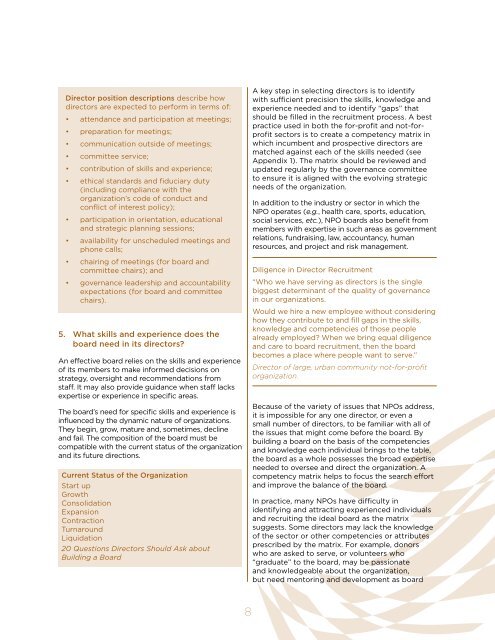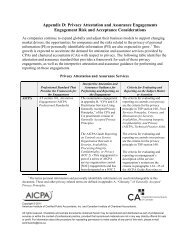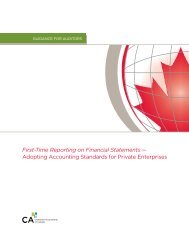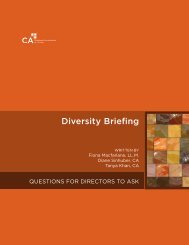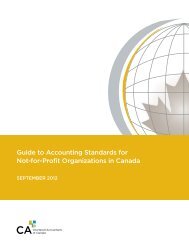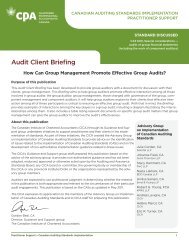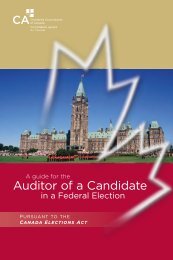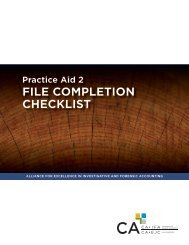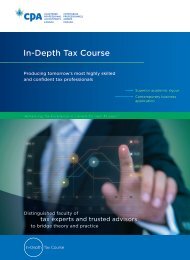20 Questions Directors of Not-for-Profit Organizations Should Ask ...
20 Questions Directors of Not-for-Profit Organizations Should Ask ...
20 Questions Directors of Not-for-Profit Organizations Should Ask ...
Create successful ePaper yourself
Turn your PDF publications into a flip-book with our unique Google optimized e-Paper software.
Director position descriptions describe how<br />
directors are expected to per<strong>for</strong>m in terms <strong>of</strong>:<br />
• attendance and participation at meetings;<br />
• preparation <strong>for</strong> meetings;<br />
• communication outside <strong>of</strong> meetings;<br />
• committee service;<br />
• contribution <strong>of</strong> skills and experience;<br />
• ethical standards and fiduciary duty<br />
(including compliance with the<br />
organization’s code <strong>of</strong> conduct and<br />
conflict <strong>of</strong> interest policy);<br />
• participation in orientation, educational<br />
and strategic planning sessions;<br />
• availability <strong>for</strong> unscheduled meetings and<br />
phone calls;<br />
• chairing <strong>of</strong> meetings (<strong>for</strong> board and<br />
committee chairs); and<br />
• governance leadership and accountability<br />
expectations (<strong>for</strong> board and committee<br />
chairs).<br />
5.<br />
What skills and experience does the<br />
board need in its directors<br />
An effective board relies on the skills and experience<br />
<strong>of</strong> its members to make in<strong>for</strong>med decisions on<br />
strategy, oversight and recommendations from<br />
staff. It may also provide guidance when staff lacks<br />
expertise or experience in specific areas.<br />
The board’s need <strong>for</strong> specific skills and experience is<br />
influenced by the dynamic nature <strong>of</strong> organizations.<br />
They begin, grow, mature and, sometimes, decline<br />
and fail. The composition <strong>of</strong> the board must be<br />
compatible with the current status <strong>of</strong> the organization<br />
and its future directions.<br />
Current Status <strong>of</strong> the Organization<br />
Start up<br />
Growth<br />
Consolidation<br />
Expansion<br />
Contraction<br />
Turnaround<br />
Liquidation<br />
<strong>20</strong> <strong>Questions</strong> <strong>Directors</strong> <strong>Should</strong> <strong>Ask</strong> about<br />
Building a Board<br />
A key step in selecting directors is to identify<br />
with sufficient precision the skills, knowledge and<br />
experience needed and to identify “gaps” that<br />
should be filled in the recruitment process. A best<br />
practice used in both the <strong>for</strong>-pr<strong>of</strong>it and not-<strong>for</strong>pr<strong>of</strong>it<br />
sectors is to create a competency matrix in<br />
which incumbent and prospective directors are<br />
matched against each <strong>of</strong> the skills needed (see<br />
Appendix 1). The matrix should be reviewed and<br />
updated regularly by the governance committee<br />
to ensure it is aligned with the evolving strategic<br />
needs <strong>of</strong> the organization.<br />
In addition to the industry or sector in which the<br />
NPO operates (e.g., health care, sports, education,<br />
social services, etc.), NPO boards also benefit from<br />
members with expertise in such areas as government<br />
relations, fundraising, law, accountancy, human<br />
resources, and project and risk management.<br />
Diligence in Director Recruitment<br />
“Who we have serving as directors is the single<br />
biggest determinant <strong>of</strong> the quality <strong>of</strong> governance<br />
in our organizations.<br />
Would we hire a new employee without considering<br />
how they contribute to and fill gaps in the skills,<br />
knowledge and competencies <strong>of</strong> those people<br />
already employed When we bring equal diligence<br />
and care to board recruitment, then the board<br />
becomes a place where people want to serve.”<br />
Director <strong>of</strong> large, urban community not-<strong>for</strong>-pr<strong>of</strong>it<br />
organization.<br />
Because <strong>of</strong> the variety <strong>of</strong> issues that NPOs address,<br />
it is impossible <strong>for</strong> any one director, or even a<br />
small number <strong>of</strong> directors, to be familiar with all <strong>of</strong><br />
the issues that might come be<strong>for</strong>e the board. By<br />
building a board on the basis <strong>of</strong> the competencies<br />
and knowledge each individual brings to the table,<br />
the board as a whole possesses the broad expertise<br />
needed to oversee and direct the organization. A<br />
competency matrix helps to focus the search ef<strong>for</strong>t<br />
and improve the balance <strong>of</strong> the board.<br />
In practice, many NPOs have difficulty in<br />
identifying and attracting experienced individuals<br />
and recruiting the ideal board as the matrix<br />
suggests. Some directors may lack the knowledge<br />
<strong>of</strong> the sector or other competencies or attributes<br />
prescribed by the matrix. For example, donors<br />
who are asked to serve, or volunteers who<br />
“graduate” to the board, may be passionate<br />
and knowledgeable about the organization,<br />
but need mentoring and development as board<br />
8


